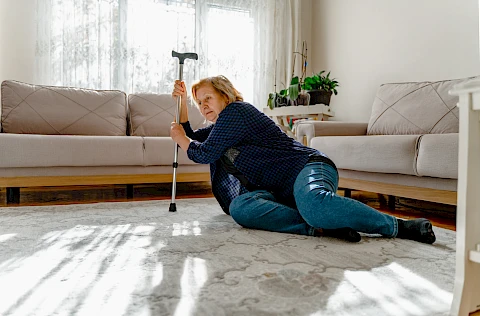
Maintaining our balance and stability can become challenging with age, making falls a common concern among seniors. Even if a fall seems mild and you can get back up without any noticeable harm, it is crucial not to overlook it. Addressing the situation promptly and understanding the potential implications can help ensure your continued well-being. Senior Helpers discusses the impacts of seemingly mild falls in seniors, the steps you should take afterward, and how to prevent them in the future.
The Potential Impact of a Mild Fall
A mild fall might not appear serious at first. However, invisible injuries or delayed symptoms are more common than you might think. Sometimes, bruises, sprains, or mild concussions can go unnoticed immediately after a fall. The psychological impact of falling can also lead to a heightened fear of falling again, which might cause you to limit your activities and reduce your overall quality of life.
Immediate Steps to Take After a Fall
Assess yourself for any injuries after experiencing a fall. Check for bruises, cuts, or any sharp pain. It is crucial to stay calm and give yourself time to get back up. Take a few deep breaths and carefully move to a nearby chair or stable piece of furniture for support. If you feel dizzy or notice any severe pain, seek immediate medical attention. It is essential to call for help if you are unable to get up or call 911 if you have access to a phone.
Why You Should Consult With Healthcare Professionals
See your doctor after experiencing a fall, no matter how mild it appears. Some injuries may not be immediately apparent. Early diagnosis can prevent potential
complications. During your appointment, discuss any pain or discomfort you are experiencing, even if it feels minor. Your doctor may recommend tests or imaging to rule out any underlying issues.
How to Prevent Future Falls
There are several steps you can take to prevent future falls. Here are a few to consider:
- Ensure Home Safety: Remove tripping hazards like loose rugs, clutter, or electrical cords. Make sure your home is well-lit and grab bars are installed in the bathroom.
- Exercise Regularly: Regular exercise can help improve your strength and balance. Yoga or tai chi are a good choice for seniors. Look for community centers that offer classes tailored for seniors. Remember to consult your doctor before starting any new exercise routine.
- Review Medications: Speak with your healthcare provider to review your medications. Some prescriptions can cause dizziness or drowsiness, which can increase your risk of falling.
Build a Support Network
Maintain open communication with family and friends about your needs and concerns. Take advantage of community resources available to seniors. Utilize these services to stay connected and informed. Check out nearby senior centers, as they are great places to make new social connections and enjoy various programs designed to enrich the lives of seniors.
Stay Safe and Independent With In-Home Care From Senior Helpers
Even a mild fall can lead to serious issues over time. Taking quick action, monitoring symptoms, and seeking help if needed can protect your health and independence. It is even more reassuring when you have an in-home caregiver you can rely on at all times. Senior Helpers Chicago/Evanston specializes in senior home care services and solutions, from assistance with daily living tasks to home safety evaluation. If you live in Chicago or anywhere in Cook County, IL, contact us anytime to learn more about our services!